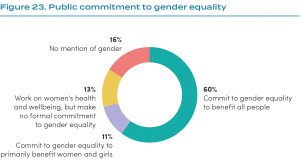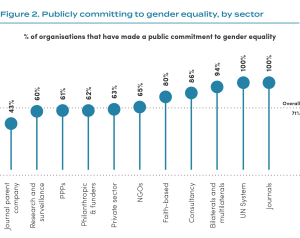Public commitment to gender equality: on the rise
Gender equality, as a right in itself and a condition for health and development, has been an explicit global health commitment since 1994. Agenda 2030 for Sustainable Development recognises the achievement of gender equality as a prerequisite for sustainable development, including in the context of health.
More and more organisations are publicly committing to gender equality in their vision and mission statements, policies and core strategies. Seven out of ten organisations (143/198) reviewed publicly state their commitment to gender equality in their mission, vision or major policies and strategies.
This marks a notable increase over the previous year where just over half of the organisations (55%; 76/140) stated such a commitment.
The message that gender equality serves all people appears to be increasingly adopted by organisations. The proportion of organisations committed to gender equality primarily for the benefit of women and girls fell from 21% to 12%.
Yet one in seven organisations still fail to make any explicit commitment to gender equality.
Just 16 organisations are explicit in the inclusion of transgender people in their commitments to gender equality.
Recommendations
1.1 Global organisations active in health should make an explicit public commitment to gender equality.
1.2 Having made a commitment to gender equality, leaders of global organisations should adopt policies and incentivise practices that respond to evidence on the impact of gender on the health, wellbeing and careers of all people.



